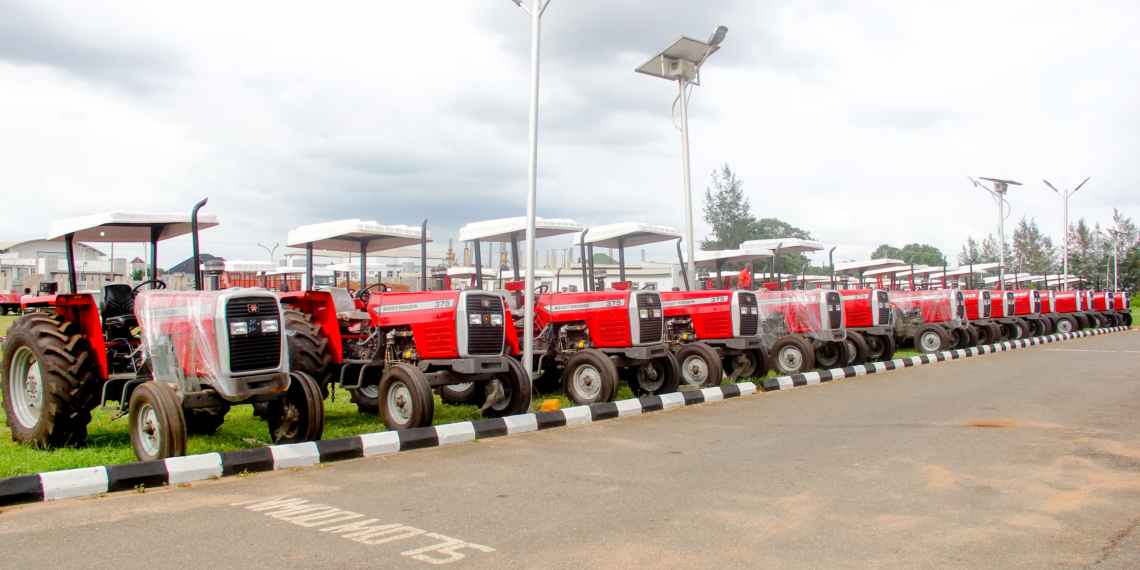Nigeria has taken a significant leap towards transforming its agriculture sector, with the official deployment of 2,000 tractors under the Renewed Hope Agricultural Mechanisation Programme. The launch event, held at the National Agricultural Seeds Council along the Abuja–Lokoja Expressway, attracted key government officials, lawmakers, foreign partners, and representatives of Nigeria’s vibrant farming communities.
During the commissioning, President Bola Ahmed Tinubu underscored his administration’s focus on overhauling Nigeria’s farming methods to guarantee both food security and improved livelihoods for rural Nigerians. Emphasizing the historic nature of the initiative, he said, “We are proud of our commitment. We are taking steps to address food security as promised. Two years ago, I raised an alarm on the food crisis. Today marks the beginning—the first phase of a comprehensive solution.”
The president described the mechanisation drive as a bold move to empower farmers, replace manual labor with modern equipment, and elevate rural prosperity. “Our ambition exceeds self-sufficiency; we want Nigeria recognized as a major global provider of quality agricultural produce. This programme is just the start,” Tinubu added, calling it a cornerstone of his food security policy and an important step for national development.
The tractors and their accessories are to be distributed across the country using a service-provider model, designed to boost smallholder farmers’ access to modern machinery, minimize drudgery in the field, and increase crop yields. Tinubu urged that this opportunity should mark a decisive turn in Nigeria’s pursuit of agricultural autonomy. “With our land, our people, and modern tools, let this day signal the beginning of Nigeria’s agricultural renaissance. Technology will work side by side with our farmers’ resilience to achieve prosperity for all,” he said.
Crucially, President Tinubu acknowledged the collaboration with international partners, especially the Republic of Belarus. Belarus reportedly played an instrumental role in supplying the tractors, transferring agricultural machinery expertise, and training Nigerians for the new era of mechanised agriculture.
“Our network of global friends is strong. Belarus stands out for supporting a programme that will enable our youth—teaching technical skills, encouraging innovation, and boosting employability in the field of machine operation and fabrication,” Tinubu explained. He made particular mention of Alex Sigman, a Belarusian businessman and former university classmate, who played a pivotal role in brokering the collaboration between both nations.
“Alex and I were neighbours in Chicago, never imagining we would one day join forces—one as President of Nigeria, the other a prominent Belarusian businessman—advancing the goals of both countries through agriculture,” Tinubu reflected, highlighting the extraordinary ties woven through global education and long-term partnerships.
Tinubu commended Nigeria’s Ministry of Agriculture and Food Security for its frontline role in kickstarting the mechanisation campaign. He called for transparent deployment and strict accountability among those entrusted with the new equipment. “All stakeholders must put these assets to optimal use. We will support, supervise, and hold you responsible for outcomes,” the president added, pledging ongoing oversight and community involvement.
In his remarks at the event, Minister of Agriculture and Food Security, Abubakar Kyari, recalled Tinubu’s emergency declaration on food security back in July 2023. “Mechanisation has since become central to the Renewed Hope Agenda,” Kyari stated, outlining the four priority programmes under the current administration: the John Deere Tractorisation Programme, the Greener Hope Project, the Green Imperative Programme, and the newly launched initiative involving tractors from Belarus.
Kyari explained that the Belarus Project—implemented in collaboration with private firm AfTrade DMCC and the Belarusian government—delivered 2,000 high-spec tractors, 10 combine harvesters, 12 mobile workshops, 9,000 implements, and a substantial stock of spare-part kits. “Never before in Nigeria’s history have we seen a mechanisation project with this size and single-minded national focus. This marks Nigeria’s largest-ever push to mechanise farming,” Kyari said.
This transformative programme reportedly aims to open up over 550,000 hectares to cultivation, generate more than 2 million metric tons of staple foods, create upwards of 16,000 new jobs, and directly benefit 550,000 farming households. To support effective implementation, components such as operator training, satellite-tracked (GPS-enabled) machinery for better transparency, a structured loan repayment system, and free machinery allocations for research and educational bodies have been integrated.
According to Kyari, special attention will be paid to engaging Nigeria’s youth, providing opportunities in machine operation, maintenance, logistics, agricultural extension, and agri-tech innovation—important dimensions as Nigeria faces a major youth unemployment challenge.
The event also featured global perspectives. Viktor Karenkevich, Deputy Prime Minister of Belarus, congratulated Nigeria for “launching a strategic and timely intervention to consolidate food security.” He delivered a goodwill message on behalf of Belarusian President Alexander Lukashenko, describing the collaboration as a sign of deepening friendship. “Belarusian equipment is prized globally for reliability, affordability, and toughness—now present in over 100 countries worldwide,” Karenkevich noted.
Karenkevich highlighted a recent roadmap agreement signed at the 2024 Belagro Exhibition in Minsk, paving the way for joint agricultural mechanisation efforts. “Today, our machinery begins serving the Nigerian people—this is the initial stage of a landmark bilateral project that is taking our cooperation to new heights,” he said, confirming Belarus’s readiness for future phases, including maintenance centres, assembly plants, grain storage infrastructure, and expanded technical training in Nigeria.
On a broader note, Karenkevich stated, “Agricultural mechanisation is just one facet of our cooperation. The potential for Belarus–Nigeria relations is immense, built on mutual respect, equality, and trust. We approach Africa as friends, to help you master your land and fuel development in industry, science, and agriculture,” he asserted. He also extended a formal invitation from President Lukashenko to President Tinubu to visit Belarus, emphasizing ongoing diplomatic and economic ties.
The commissioning was attended by influential figures such as APC National Chairman Abdullahi Ganduje, Niger State Governor Mohammed Bago, National Assembly members, farmer cooperatives, and international development partners—signifying the programme’s national significance and the wide interest it has generated among stakeholders.
Local farmers, agricultural experts, and rural communities have largely welcomed the mechanisation initiative, voicing hopes for increased production, easier access to farming technologies, and more job opportunities. However, some caution that sustained investment, genuine empowerment, and careful management will be crucial for long-term success. According to Lagos-based agricultural economist Chukwudi Okeke, “Providing equipment is a good start, but issues like spare part availability, operator training, and rural infrastructure will determine real impact.”
Farmers’ groups point to the importance of ensuring that both large and small-scale farmers benefit equally and that corruption or misallocation of equipment is prevented. “We must learn from past projects, where machinery ended up unused or concentrated in the hands of a few. This time, there must be transparency so every local cooperative gets a fair share,” said Fatima Lawal, a cooperative leader in Kaduna State.
Comparatively, neighbouring Ghana and Kenya have also launched mechanisation drives, yielding mixed but generally positive results where community service models and government-private sector collaboration are emphasized. Nigeria’s scale of ambition sets a new benchmark in West Africa. Yet challenges remain—ranging from poor rural road networks and insecurity in some farming regions, to high input costs and persistent youth migration from rural areas.
Experts recommend that, alongside the tractor deployment, Nigeria should invest in rural power, irrigation, value-chain infrastructure, and agro-processing clusters to ensure that increased production leads to better incomes and employment for ordinary Nigerians. Long-term success may hinge on continued partnership with global manufacturers, local universities, farmers’ groups, and government at every level.
As the programme gets underway, all eyes are on how the tractors will reshape the agricultural landscape, support national food goals, and uplift rural families. Nigerians and observers across Africa and around the world will be watching to see if the country’s agricultural renaissance can become a model for the continent.
Do you think nationwide access to modern farming equipment will transform Nigeria’s agriculture and create real opportunities for local communities? What are your experiences or hopes for this new era in mechanised farming? Share your thoughts below and join the conversation.
For general support, reach out at support@nowahalazone.com.
Follow us on Facebook, X (Twitter), and Instagram to stay updated and join the community discussion!










